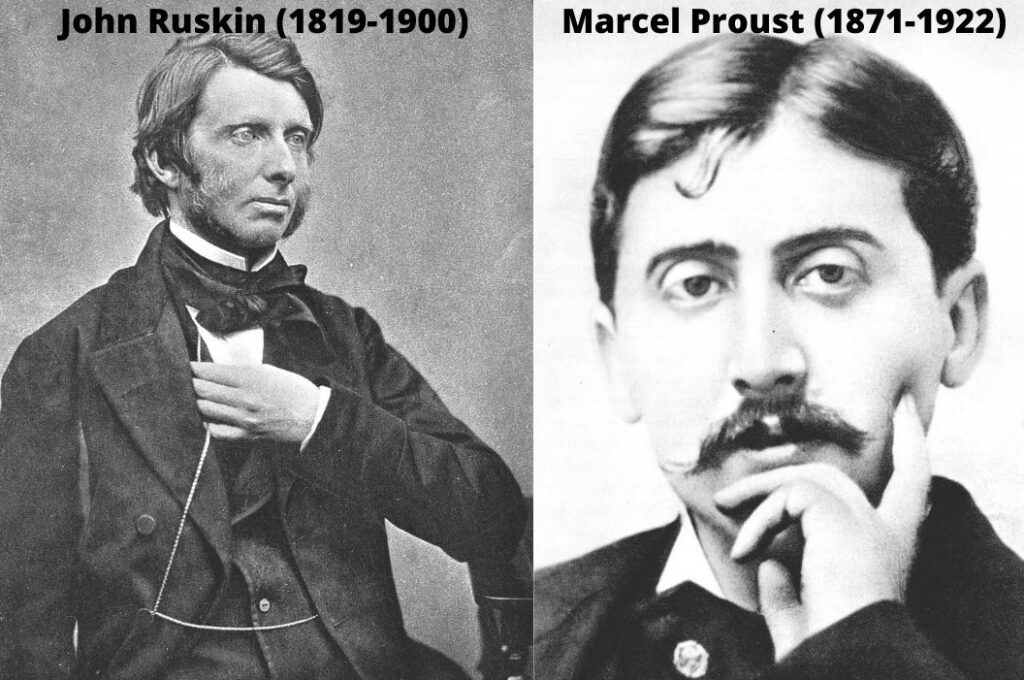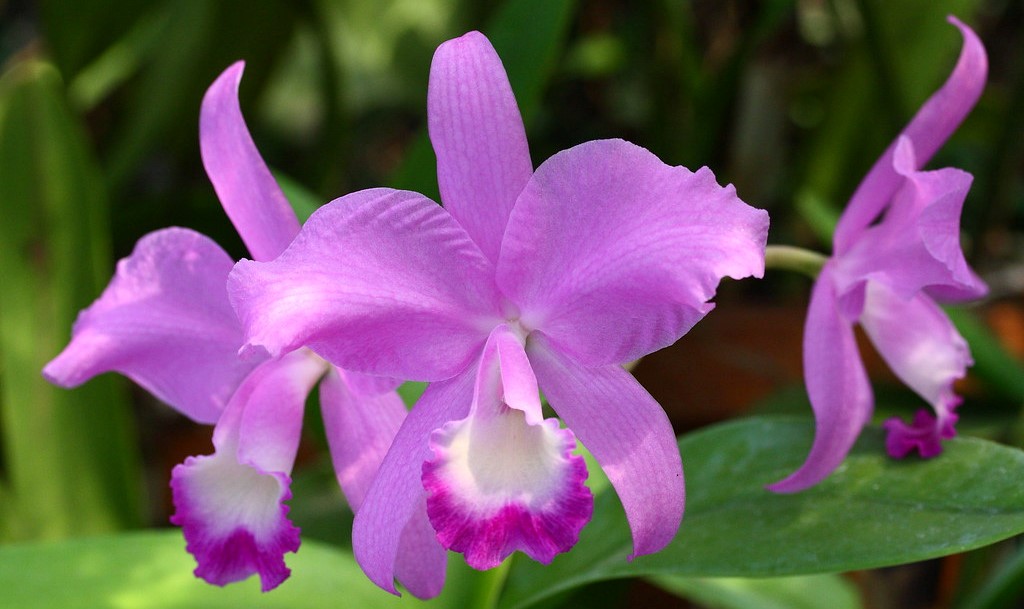
For they contain all the beautiful, obsolete forms of language which preserve the memory of usages and ways of feeling that no longer exist, enduring traces of a past unlike anything in the present, whose colors only time, in passing over them, has been able to enhance.
Ironically, Proust was talking about the major archaic writers, and how we as modern readers can connect to those worlds of the far past through the words of the writer, in the quote above. It comes from the introduction he wrote for Ruskin’s Sesame and Lilies, a French translation. Now, around one century after he wrote his timeless masterpiece, one can, if one perches oneself on the frontier of time, as in the present, read his words, indeed with a sense of irony, as if they were about his own works, and also, for that matter, about the works of his elder, an ornithologist, among other things, from London, and a man who, at one time, had been an inspirational personage to a budding writer named Valentin Louis Georges Eugène Marcel Proust, an M. John Ruskin.
Alas, the subject of today’s infernal method: I must write my sins’ Keatsian libation.
I did something just now that I’d never done before: I skipped the preface of a printed lecture. And what’s further, I’ve only just begun. I committed more than just one skip in skipping so; O God have mercy! I must here reluctantly transpire and transcribe yet another readerly confession into words: I committed an additional surrendering. Something additional to this novel, liberating, guilt-betokening experience which I’ve here described ambiguously as a skip, another thing which I never dared do before just now, another thing which had been, in its kindred occurrence, simultaneous and philosophically one with the original skip: I skipped over an author-in-focus‘s work for another work, a lesser one (in my well-educated opinion, this opinion of which I refer to being the invisible thing, more or less, which had had, in the situational example, the power of Aristotelian discrimination and which then chose to bequeath, due to a certain primary interest in the author’s work, an author as an author-in-focus), one which had been published with meaningful adjacency and enterprise alongside the author-in-focus‘s work in a single serendipitous edition, that is to say, in the same potentiate reader’s breath. I also committed a third never-before-done sin. Alas, the gods will do what they will with my poor soul! Well, at least it remains and shall remain a sin in the sinner’s eyes. I may be exaggerating, or proliferating unnecessarily; if I am, and here I wilfully betray myself, to better lubricate and plum my work’s effusion, I can say that I am simply exhibiting a landmark sign known to be the foundation of every piece of true, time-tested literary criticism. That is to say, I here fly the lonely un-institutionalized flag of non-academic art for art’s sake. The international Avant-Garde is not dead. Anyway, I skipped a piece by Marcel Proust to read one attributed to John Ruskin, such was the third triunity sin aforementioned, the readerly sin that I’d been going on about. Was it a sin? This brief critical essay and its author assume themselves able to assail such a seemingly arbitrary literary question and juncture, in the name of a highly sensual and all-engulfing Platonic-Romantic, that is to say, confused an irrefutable, yet passionate and given to moods, a relationship which the author has been keeping with the gross conglomerate mass of World Literature since 2007.
Translated into English as to do a cattleya, forever faire Catleya in its original French, this Proustian term retains, for all knowledgeable Proustians and for all those with any postmodern literary merit whatsoever, a meaning both amorous and symbolic: the act of making love. This is curiously hilarious, as M. Proust, for his timeless, floristic metaphor, carefully chose a flower which the Narrator here very much concurs (as in, my boyish subconscious concurs) looks like a man and woman embracing, like a petal-man bucking with pollenistic passion over the open-legs of a woman-of-the-pink-petals, she who blooms Siamese-like beneath him, there go the both of them, petalled and painted by God himself, there in the purple air of the field-shade going at it, sin interruption except for the wind’s now-and-then quaintly handyman voyeurism. Bravo, M. Proust!

The Cattleya flower
At this juncture, the reader must become familiar with a few collateral purposes related to the more humorous literary understanding which can, if one chooses to tolerate its wry and benevolent smile, be found in this literary article. The biographical parallels between the two men, two linearly detached contemporaries (Ruskin died during the beginning of Proust’s literary ascent in France), are just this, one having been made clear by almost every modern biography of Proust and the other having been made clear by almost ever modern biography of Ruskin, and, in Ruskin’s case, this bibliography even includes a film (Effie, 2014) which tears down the veils which had remained somewhat intact during his life, the fact that Proust and Ruskin never were interested in, as far as any of the literati’s files or the academic-historian records are concerned, making it with a lady. The Narrator here lightly interposes that, though this biographical fact is belligerent-seeming, on a lighter note, it does indeed prove both men, both Ruskin and Proust (as if we had asked for a comparison to be made), were better men than the Narrator is, the Narrator being a man who, an inveterate heterosexual, falls hopelessly in love with every poor pretty lady who passes him out on the blessèd streets, a tender neurosis similar to the one we may see for ourselves exhibited in Salinger’s Catcher. Proust was, as far as that goes, a keen-minded intellectual and a fervent lover of the same sex (though whether this accounts for or whether its experiences and its charted beauties existed in spite of his wise discernment of the moving landscapes of a woman’s ever-changing mind we, as interested readers, will perhaps never know). He was in love with the composer Reynaldo Hahn, with whom he shared a romantic relationship until his death, and he led the quiet life, for the most part, of a dilettantish, mentally dexterous homebody. John Ruskin was a religiously fervent and nervous man who forever put off the consummation of his ill-fated marriage to Euphemia Gray, or Effie as Ruskin called her, eventually rupturing it. Thus, we have faire Catleya, a quasi-household term for any M. Proust lover, at least it remains one to me, and we have the titular non-entity of John Ruskin’s poetically boiling blood, its Proustian blood-brother. Thus, we have two allergies that came to be, posthumously for both authors, major biographical factors, as far as their popular legacy goes. Beautiful, magnificent legacies they are, the both of them.
The thrice-committed sin which I, quite regrettably, lugubriously described earlier, in its incarnation, had been related to my reading a special translation of M. Proust’s introduction to one of M. John Ruskin’s works. From one clause to the next, grammatical extensions and phenological reverberations. Proust, five years after Ruskin passed, wrote an introduction to a small body of his work (Sesame and Lilies) which, to this day, acts as a sort of aesthetic blueprint for anyone who wishes to dive more deeply into the story of Marcel Proust’s veritable becoming as a writer. For, though he shakily attempted to complete one narrative novel before he attempted (and at least somewhat succeeded) to write À la recherche du temps perdu, which he conceived and began hazily to sketch around 1909, and which he formally began to tackle in 1913, writing it from then to just before his death in 1921, he had already originally found, some researchers say, his voice in the act of writing the prosy, intimate introduction to his beloved Ruskin’s work. M. Marcel Proust died in November of 1922. His later work was, however, not published in its entirety until later, in 1927. In his introduction to Sesame and Lilies Proust explicitly exhibits all of the main ideas which will come to dominate his literary philosophy, form, and style; in the idiosyncratic introduction that he wrote in 1905 for the English writer and polyglot John Ruskin’s Sesame and Lilies he gives us, with a kind of latent literary periphery, his first decadently amendable and recognizably Proustian self-portrait. I guess ol’ Ruskin, for what it’s worth, could be dubbed, at the end of the day, as worthy, too, of being an author-in-focus. Well, as for my three little literary pet-sins, I’ll say it here (speaking the manifold image-languages of a slighted Grecian urn) as a faulted reader, thus as a doubly faulted writer, and thus as a thrice faulted poet:
I’ve Writ My Sins’ Weight in Libations
Órgiva
2022.
Also, read three Taiwanese poems, self-translated by Yi Jung Chen, published in The Antonym.
Follow The Antonym’s Facebook page and Instagram account for more content and interesting updates.
For the month of September, The Antonym will be celebrating Translation Month to mark International Translation Day celebrated on 30th September. A number of competitions, giveaways, podcasts, and more have been lined up for the occasion. Please join The Antonym Global Translators’ Community for updates!


























0 Comments